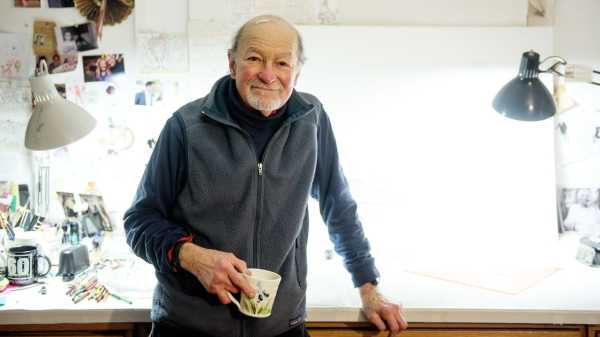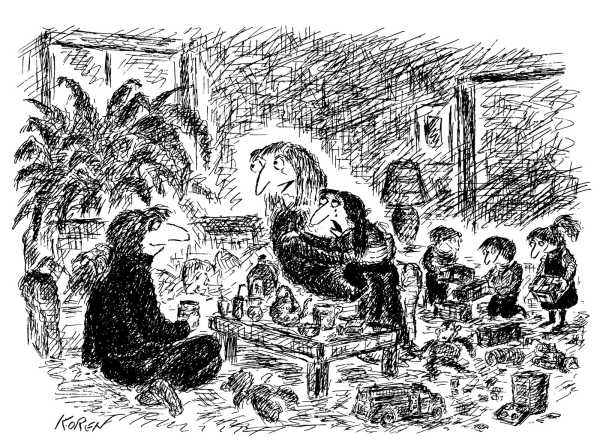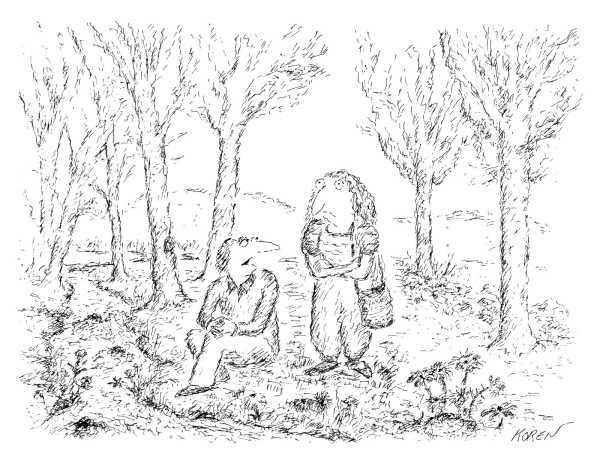
“Being one of the anciens in your new flock, I will be particularly pleased to work with you, as well as offer up whatever of my accumulated institutional wisdom you might find useful,” the artist Edward Koren wrote to me—in his jaunty, winkingly semi-formal way—when I became cartoon editor. He went on, “I’m eager to shake your hand and continue on the familiar—and immensely satisfying—path I’ve been taking for a while now.” At the time, he was eighty-one, and “a while” denoted fifty-four years of publishing cartoons of his beaky, hirsute creatures—whether human or flora or fauna—in our pages. This morning, he died at eighty-seven, having produced more than a thousand New Yorker gags, illustrations, and covers.
Trying to describe Ed to a friend recently, I kept returning to the phrase “rubber ball.” The man was indefatigable, unsinkable—biking, hiking, skiing, and salsa dancing more than most people a quarter of his age do. He was perpetually rosy-cheeked, from all the athletics, no doubt, and from decades of jollity. The first time we met, he’d driven himself down from Brookfield, Vermont (where he served as a volunteer firefighter, in addition to being the state’s second cartoonist laureate) and then biked from Greenwich Village to the World Trade Center, all for that handshake.
Ed liked to describe the single-panel cartoon as “a lightning-fast one-act play that takes place in a frozen moment in time, with a specific goal: laughter.” And the productions that his characters put on—whether suburban community theatre or Broadway spectacle—were sidesplitting. He was a philosopher of the form, but he never stopped marvelling at the miracle of its creation. “When pen hits the paper, the mind follows the hand,” he once told me.
In recent years, he rebounded from health setbacks with such cheer that it was easy to believe that nothing would ever penetrate his armor of good humor. After one of our final in-person meetings, he sent me a George Eliot quote he’d been searching for. Eliot suffered from terrible migraines, and, when queried about her health before an attack, she would reply that she was “dangerously well.” “I find it applicable in most ways as a report of one’s well-being,” Ed said. But it was also “an acknowledgement of the fragility of it all.”
Each time Ed had another encounter with his “pal, the surgeon”—whom he did not begrudge for having “to maintain his skills”—he’d promise to quickly “be back with fervor at the drawing board, conjuring up malevolent, wicked delights and pleasures for your eyes.” And sure enough, his shaggy Vermonters and Manhattanites, his farmers’-market devotees and NPR donors—by way of Snuffleupagus by way of Daumier—whose pretensions and obsessions he affectionately lampooned, would soon be parading into my in-box. In his final months, he didn’t have the energy to draw as large, or with such obsessive, scratchy detail, as before, but he still couldn’t resist reworking one final cartoon—featuring the Grim Reaper, as a poet—before sending it off to me last week.
In May, 1962, The New Yorker made the excellent choice to accept its very first Koren cartoon: a bedraggled writer, laboring at a typewriter, wearing a sweatshirt emblazoned with the word “SHAKESPEARE.” Despite the success that followed—when “Star Wars” came out, the Washington Post likened its alien cantina drinkers to “an Edward Koren cartoon . . . sprung to life”—one sensed that Ed returned to the drawing board prepared to go twelve rounds with the Muses. Send a kind word, and he’d likely respond with something like “The pencil is encouraged and will now run on the paper until it has accomplished its always uncertain path.” It’s terrible to think that the pencil is now laid down.
On a recent call with Ed, when I expressed awe at the fact that he was still sending in cartoons for me to review, he quoted Mark Twain: “The secret source of Humor itself is not joy but sorrow.” Neither of us mentioned the second half of that line—“there is no humor in heaven.” For believers, there’s certainly now no need to mention it ever again, what with Ed’s arrival. ♦
-

Cartoon by Edward Koren
-

“She’s not very good at defending herself, but she does very well at identifying her feelings.”
Cartoon by Edward Koren
-

“Now what?”
Cartoon by Edward Koren
1 / 15ChevronChevron
Sourse: newyorker.com






